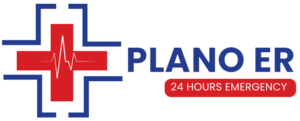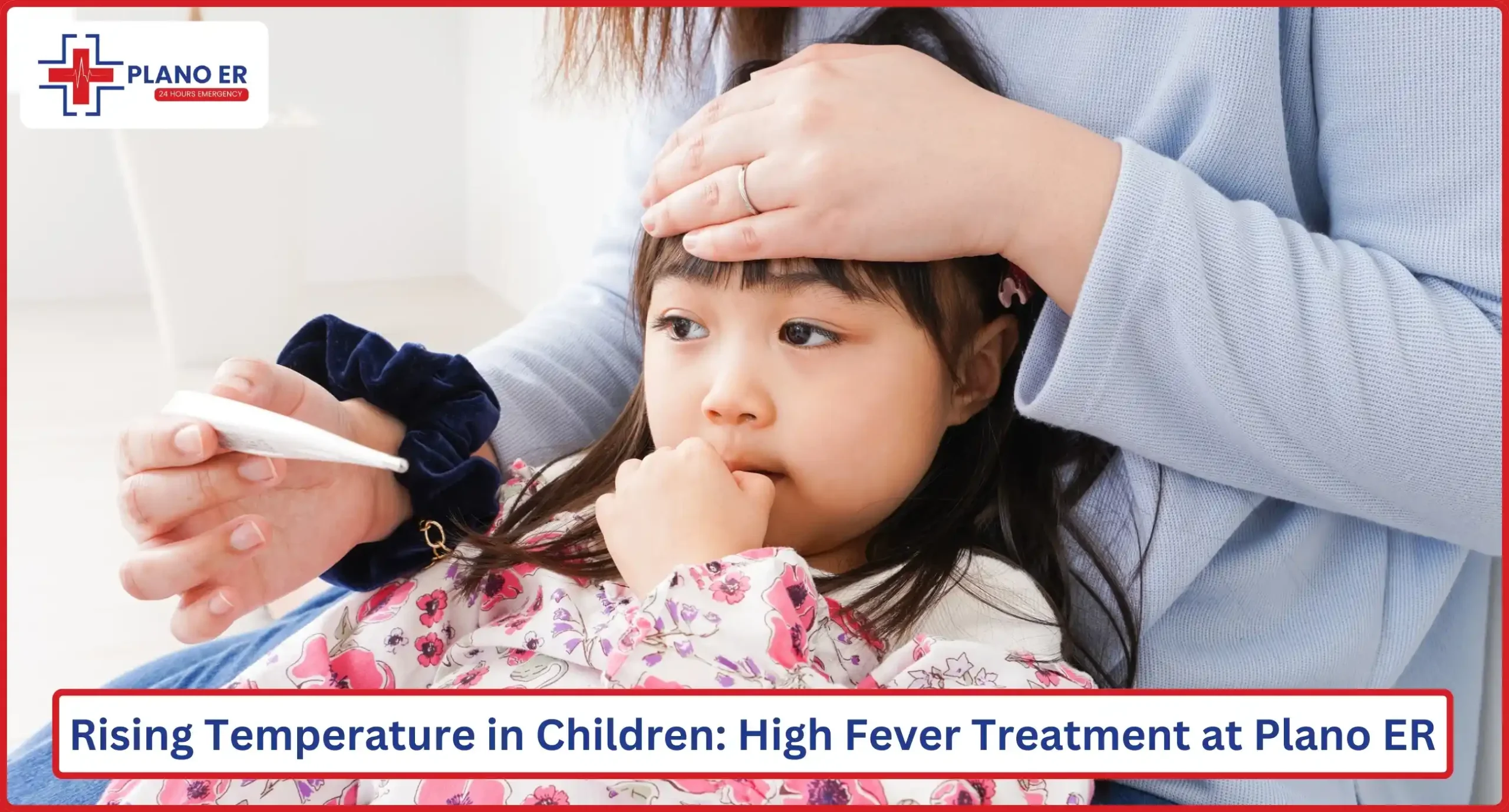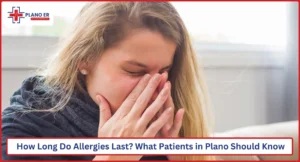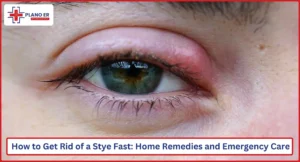A sudden increase in your child’s temperature can be frightening, especially when it doesn’t respond to home remedies. Mild fevers are often part of the body’s natural immune system fighting back from an infection, but if the high fever remains persistent, it may be a sign of serious illness.
Knowing its early signs, causes, and warning signs helps parents understand when a high fever requires immediate medical attention. Moreover, it also illustrates when home remedies are most effective for treating high fever.
With 24/7 access to board-certified emergency physicians and child-focused care, Plano ER ensures that families receive fast, reliable medical attention.
In this blog, we will provide details on when a higher fever treatment is required for your children, so that you know when to visit Plano ER for emergency medical services.
Understanding High Fever in Children
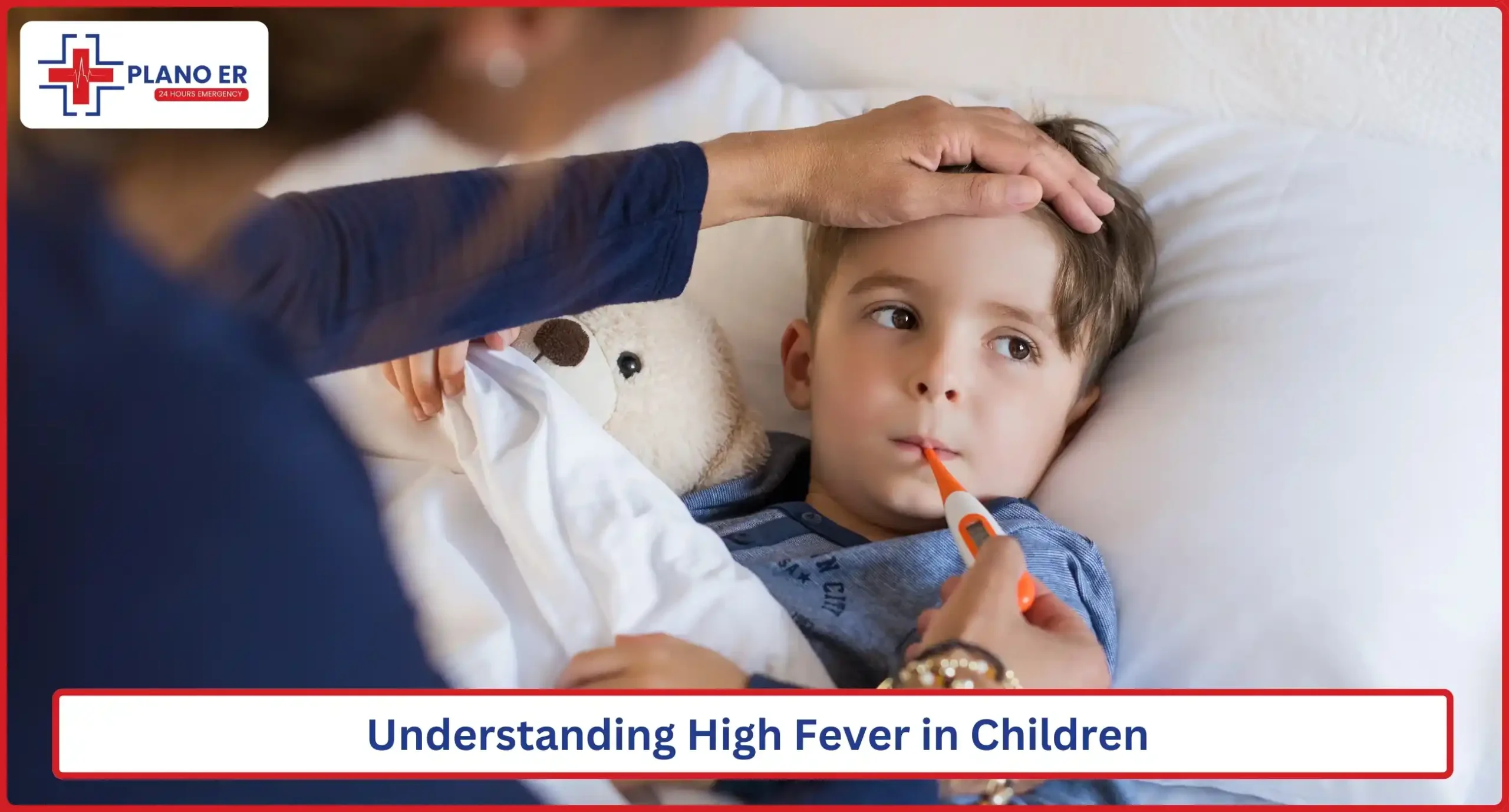
High fever in children can be alarming for parents, especially when temperatures increase rapidly. It is important to know when to seek emergency high fever treatment at Plano ER so that you can avoid complications.
What Is a High Fever?
In children, a fever becomes a concern when it reaches:
- Above 102°F (38.9°C) for infants under 3 months
- Above 104°F (40°C) for children older than 3 months
Fever is the body’s natural response to infection; however, if it reaches to higher level, then it requires an effective high fever treatment.
Early attention through severe fever urgent care and high fever care can reduce the chances of serious problems and promote faster recovery.
Warning Signs That Require Emergency High Fever Treatment
Identifying when a child’s fever is more serious can help you understand when to take the right treatment. Mild fevers often resolve on their own; certain symptoms might be a sign that immediate medical attention is required.
If a child faces any of the following symptoms, then you need to visit Plano ER immediately.
- Persistent high fever
- Fever with chills
- Lethargy
- Seizures
- Dehydration signs
- Convulsions
- Difficulty breathing or rapid breathing
- Severe headache or stiff neck
- Persistent vomiting or diarrhea
- Rash or unusual skin color changes
- Underlying chronic conditions
Pediatric Fever Emergency Care at Plano ER
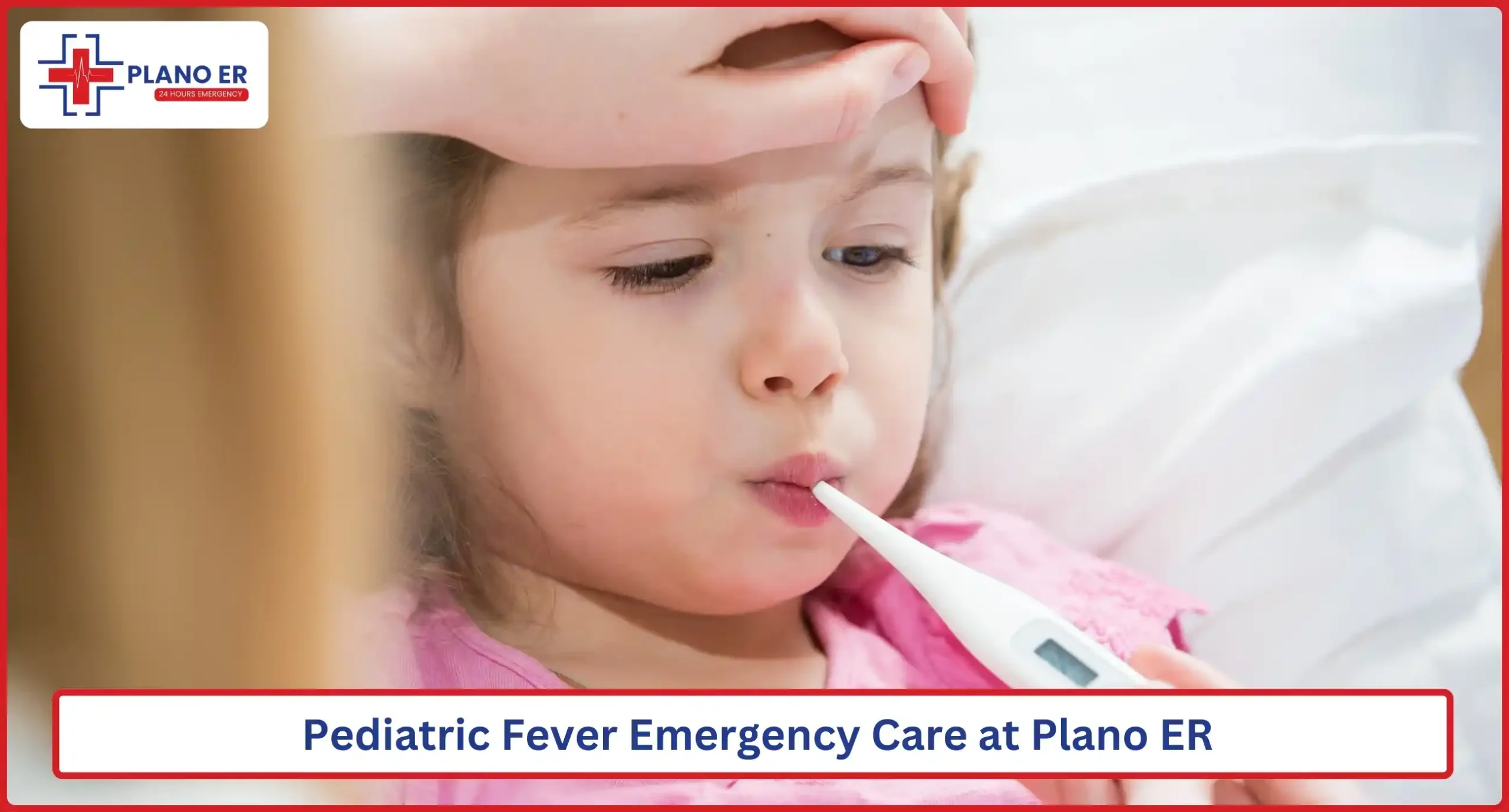
When a child is suffering from a high fever that doesn’t get back with home remedies or shows concerning signs, then pediatric fever emergency care at Plano ER becomes essential. At a Plano ER, we have trained pediatric specialists who help in rapid diagnosis with effective treatment.
Children are more sensitive to complications such as febrile seizures, dehydration, or serious infections, making quick diagnosis and rapid recovery essential. Early intervention from skilled professional paediatric doctors can help in speedy recovery and also avoid the chances of serious infection.
Parents searching for “high temperature ER care near me” can trust our ER team, who are trained and equipped to deliver rapid fever relief emergency care.
Common Causes of High Fever in Children
High fever in children can appear due to different underlying causes, from common viral infections to more serious bacterial illnesses. It is important to understand these causes, as it is the key to the right treatment.
| Cause | Description | When to Seek Care |
| Viral Infections | Cold, flu, RSV, or COVID-19 can trigger a high fever. | If the fever is persistent, very high, or accompanied by lethargy or dehydration. |
| Bacterial Infections | Ear infections, pneumonia, strep throat, or UTIs often cause more serious fevers. | If a high fever appears suddenly or comes with chills, vomiting, or breathing issues. |
| Heat or Environmental Factors | Overheating or heatstroke can raise body temperature dangerously. | Fever increases quickly or shows signs of dehydration. |
| Inflammatory Conditions | Juvenile arthritis or other inflammatory issues. | Contact pediatric care if the fever lasts longer and no treatment is helping. |
If your child shows any of the above symptoms, don’t wait; immediately visit at Plano ER for high fever treatment. Medical professionals at our ER provide rapid evaluation and perform necessary emergency lab tests to identify the underlying cause of the fever, ensuring effective and timely care.
Prevention and Home Monitoring Tips
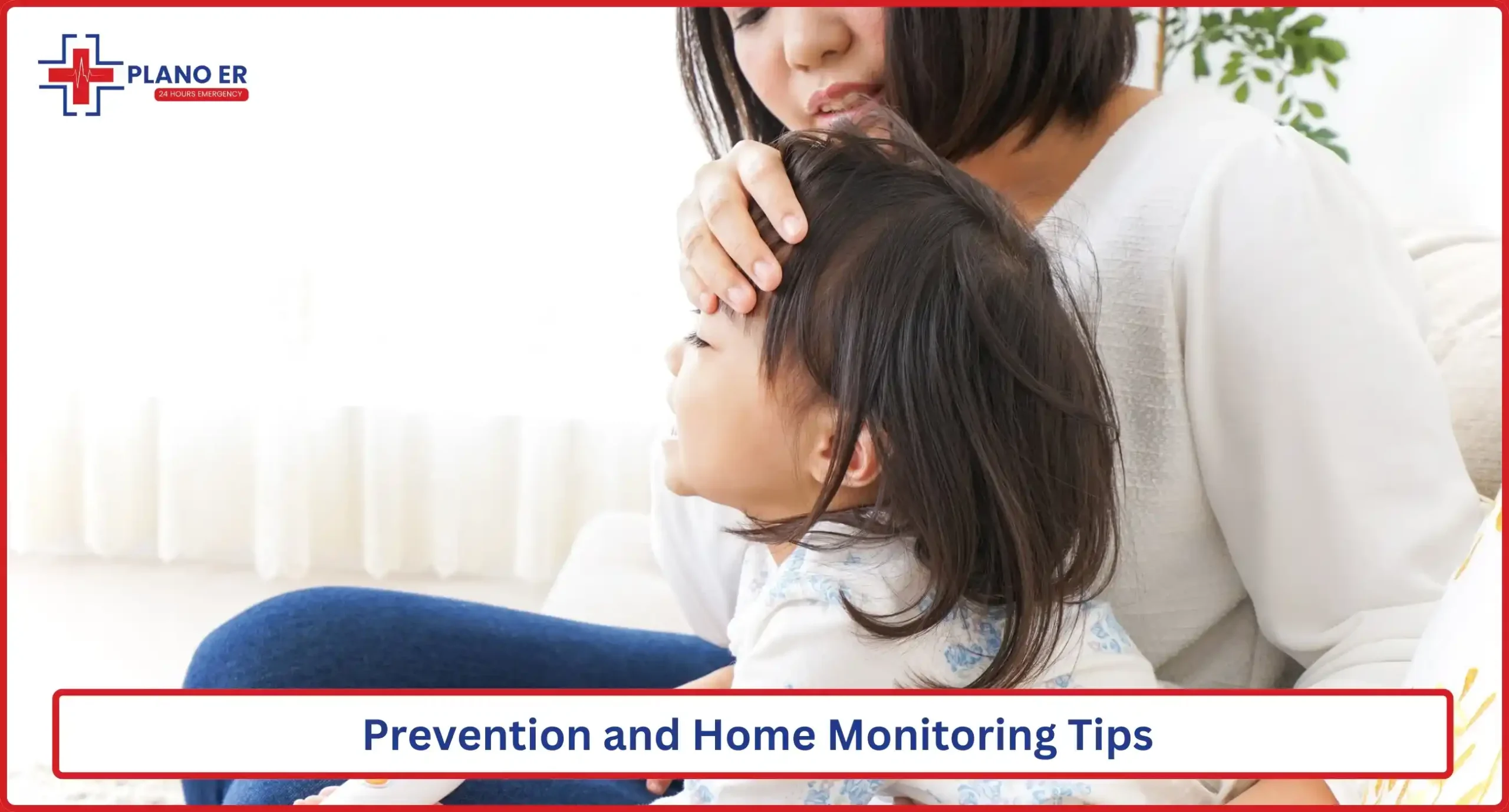
At times, high fever in children can be controlled at home. There are a few prevention tips that doctors often recommend practising at home if your child experiences a sudden fever.
Below are a few helpful monitoring tips that you can practise at home:
- Monitor Temperature: Use a reliable thermometer to monitor the temperature.
- Stay Hydrated: Drink water, soup, and liquid intakes to maintain hydration.
- Wear the Right Clothes: Lightweight clothing, or cool compresses, can help control body temperature.
- Medications When Necessary: Take medications that are normally recommended by doctors or visit a health care provider for a prescription.
- Watch for Warning Signs: Persistent high fever, fever with chills, lethargy, or vomiting requires immediate medical attention.
Conclusion
High fevers in children can be stressful for parents, but knowing the warning signs can help you understand when to go ER. Timely high fever treatment at a Plano ER ensures your child receives pediatric fever emergency care, rapid fever relief emergency services, and the appropriate lab testing to identify underlying causes.
Monitoring symptoms at home and seeking emergency care when necessary helps in speedy recovery and supports parents in protecting their children.
If your child is experiencing a high fever or any concerning symptoms, don’t wait. Our Plano ER team provides expert pediatric fever emergency care, rapid evaluation, and high fever treatment to ensure your child’s safety.
Need Immediate Care? Call Now Get Direction
Frequently Asked Questions
When should I take my child to Plano ER for a high fever treatment?
You should seek emergency high fever treatment if your child’s temperature is very high, lasts more than 48 hours, or is accompanied by symptoms like chills, vomiting, breathing difficulty, or seizures.
What temperature is considered a medical emergency for a child?
A fever above 104°F (40°C) in younger children or 102°F (38.9°C) in infants may require pediatric fever emergency care in Plano.
Can Plano ER help with a fever caused by the flu or RSV?
Yes, Plano ER offers flu and fever urgent care, including lab testing to identify viral infections, including flu, RSV, or COVID-19.
Can teething cause a high fever?
Teething in children may cause a slight temperature rise, but not a high fever.
How long should I wait before seeking medical care?
If the fever lasts more than 48 hours, seek medical care, even if symptoms seem mild.
